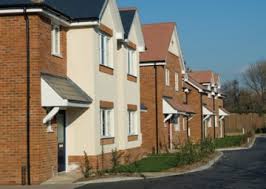Election 2017 and housing quality
When Prime Minister Theresa May called a snap General Election in April 2017, she made it clear that Brexit – and in particular her attempt to strengthen her hand ahead of trade negotiations with the European Union – was central to her decision.
Brexit has dominated the early pre-election political exchanges and with less than five weeks to go until the electorate heads to the polls, it is expected that the issue will remain at the very top of the agenda for all the main parties.
As such, BRE feel that housing and construction, as high-value commodities and significant contributors to UK export figures, should be given due consideration by all the main parties in their election manifestos. Furthermore, the debate should be extended beyond mere number-based targets to factor in wider issues such as quality and the sector’s post-Brexit significance.
The UK construction industry is currently seen as being at the leading edge of sustainable design and construction, as exemplified by the major roles played by UK companies in the success of a broad range of high-performance projects in both the UK and abroad.
As a result, the UK’s sustainable design and construction capabilities – including its knowledge and expertise as well as its focus on innovation, driven by standards such as BREEAM – have become significant contributors to UK exports.
Given that the campaign manifestos currently being finalised will span a period when UK prosperity will be heavily dependent on our position to negotiate favourable trade deals with Europe, ensuring these assets are protected and nurtured is essential.
This requires active debate and investment on a level much deeper than just numbers – both in terms of targets and budgets.
By way of example, the Labour Party has recently pledged to build one million new homes during the next five years. All well and good, but there has been no commitment given to the quality of these homes and the viability of delivering quality homes and communities.
If we are not to create any 'dead weight' (cost) to the treasury for 'UK plc', one area that the political parties could give some thought to is evolving existing mechanisms to be more effective to new challenges. With increasing demands placed on planning authorities, and reduced funding to be as much of a mantra post-election as it is pre-election, it is essential that the parties give local authorities space and capacity to look at development and the wider context of what we need to achieve at a neighbourhood/community scale.
This should be focused on seeking positive improvements in the quality of the built, natural and historic environment, as well as in people’s quality of life:
- Making it easier for jobs to be created in cities, towns and villages.
- Moving from a net loss of bio-diversity to achieving net gains for nature.
- Replacing poor design with better design.
- Improving the conditions in which people live, work, travel and take leisure.
- Widening the choice of high quality homes.
BRE hope therefore that the parties, as they look to an agenda of growth, ensure this wider perspective is taken. There has already been much talk about the police and the NHS, but to ensure that pressure isn't placed on these important services in time of crisis, better communities need to be built to reduce crime and promote healthier living.
With all the necessary elements already in place, there is just the need to take the long-term view on the viability of development – the avowed purpose of the planning system but sometimes only looked at as the viability of the individual site and not the wider community. BRE would therefore hope that the parties look to recast how development is considered.
A number of keen-eyed readers will perhaps already noticed increased amount of column inches given to land value capture as a concept. But one thing is for sure we need to:
- Take a long-term view, to ensure that issues such as inter-generational equity or climate change mitigation and adaptation are taken adequately into account.
- Address the social, economic and environmental aspects of sustainable development 'jointly and simultaneously'.
- Consider the likely success of any proposal in achieving positive improvements in the quality of the built, natural and historic environment, as well as in people’s quality of life.
Quality is a key to much that needs to be achieved to drive the success of Brexit.
This article was originally published here on 10 May 2017 by BRE Buzz. It was written by Martin Townsend.
--BRE Buzz
[edit] Find out more
[edit] Related articles on Designing Buildings Wiki
Featured articles and news
A case study and a warning to would-be developers
Creating four dwellings for people to come home to... after half a century of doing this job, why, oh why, is it so difficult?
Reform of the fire engineering profession
Fire Engineers Advisory Panel: Authoritative Statement, reactions and next steps.
Restoration and renewal of the Palace of Westminster
A complex project of cultural significance from full decant to EMI, opportunities and a potential a way forward.
Apprenticeships and the responsibility we share
Perspectives from the CIOB President as National Apprentice Week comes to a close.
The first line of defence against rain, wind and snow.
Building Safety recap January, 2026
What we missed at the end of last year, and at the start of this...
National Apprenticeship Week 2026, 9-15 Feb
Shining a light on the positive impacts for businesses, their apprentices and the wider economy alike.
Applications and benefits of acoustic flooring
From commercial to retail.
From solid to sprung and ribbed to raised.
Strengthening industry collaboration in Hong Kong
Hong Kong Institute of Construction and The Chartered Institute of Building sign Memorandum of Understanding.
A detailed description from the experts at Cornish Lime.
IHBC planning for growth with corporate plan development
Grow with the Institute by volunteering and CP25 consultation.
Connecting ambition and action for designers and specifiers.
Electrical skills gap deepens as apprenticeship starts fall despite surging demand says ECA.
Built environment bodies deepen joint action on EDI
B.E.Inclusive initiative agree next phase of joint equity, diversity and inclusion (EDI) action plan.
Recognising culture as key to sustainable economic growth
Creative UK Provocation paper: Culture as Growth Infrastructure.
Futurebuild and UK Construction Week London Unite
Creating the UK’s Built Environment Super Event and over 25 other key partnerships.
Welsh and Scottish 2026 elections
Manifestos for the built environment for upcoming same May day elections.
Advancing BIM education with a competency framework
“We don’t need people who can just draw in 3D. We need people who can think in data.”


























